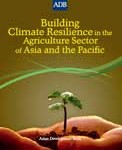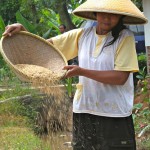MOTIVATION The Yellow River Basin is considered the “cradle of Chinese civilization,” but it has suffered severe water scarcity. The basin’s specific climatic conditions, rapid socioeconomic development, and absence of defined water rights have led to excessive water use; during the last 50 years, agricultural water use has increased by more than 250 percent and >> Read more
Building Climate Change Resilience in the Agriculture Sector
In 2009, IFPRI and the Asian Development Bank published Building Climate Resilience in the Agriculture Sector of Asia and the Pacific, a book with a clear message to development practitioners and policymakers on the threats from climate change and how to cope with them, as well as understand the opportunities that might arise with efforts to mitigate climate change.
Effects of Environmental Policy on Household Income in North China
Environmental policies have wide-ranging and far reaching effects. For example, by providing participating farmers an annual subsidy for retiring their farmland and planting saplings, the Sandstorm Source Control Program (implemented in Beijing and Tianjin from 1998 to 2003) contributed to higher household incomes.
West African Agriculture and Climate Change
Maize, millet, rice, and sorghum are the major cereal crops in West Africa, yet yields from these crops are very low compared to the world average and even other regions within Africa. A changing climate will challenge production systems already under pressure to increase output to feed a growing population.
Food Security and Climate Change: Using IFPRI Results as a Call to Action
Motivation The first decade of the twenty-first century has seen two food price crises that adversely affected poor people across the globe. During the next 40 years, as the world population approaches 9 billion and incomes in many developing countries continue to rise, agricultural production will struggle to meet increasing food demand. Climate change will >> Read more
Regional Network on AIDS, Livelihoods, and Food Security
Motivation Nutrition and access to nutritious foods are vital in the fight against HIV and AIDS. Undernutrition heightens vulnerability to disease transmission, and pairing antiretroviral drug therapies with adequate nutrition increases their effectiveness. Income inequality and food insecurity have also been found to increase the likelihood of exposure to HIV, driving up rates of infection >> Read more
- « Previous Page
- 1
- …
- 5
- 6
- 7
- 8
- Next Page »



